Program
Friday > September 20
| Main Room | Gamma Workshop Space | Zine Library | |||
|---|---|---|---|---|---|
| 12 | :00 | March for our futures: Youth climate marchQueen's Park 47 Queen's Park Crescent E
[Note: Event is independently organized] Join the Toronto part of Global Climate Strike (Sep 20 to 27)!
|
|||
| :15 | |||||
| :30 | |||||
| :45 | |||||
| 13 | :00 | Registration |
Exhibited works
|
||
| :15 | |||||
| :30 | |||||
| :45 | |||||
| 14 | :00 | Meshing around: DIY internet
>
Jillian Murphy
|
[PROTEST_BAR]
>
Brett Ian Balogh
|
||
| :15 | |||||
| :30 | |||||
| :45 | |||||
| 15 | :00 | Hands-on networking
>
Grant Gallo
|
|||
| :15 | |||||
| :30 | |||||
| :45 | |||||
| 16 | :00 | Screenprint our swag |
|||
| :15 | |||||
| :30 | Regulationism and the need for a digital postmodernism
>
Corey Abell
|
||||
| :45 | |||||
| 17 | :00 | Spectacular grammar: Infrastructure as a Universal language
>
Renée Reizman
|
|||
| :15 | |||||
| :30 | Remaking the web: Competing visions of decentralization
>
Jack Jamieson
|
||||
| :45 | |||||
| 18 | :00 | ||||
| :15 | |||||
| :30 | |||||
| :45 | |||||
| 19 | :00 | ||||
| :15 | |||||
| :30 |
Kickoff party
|
||||
| :45 | |||||
| 20 | :00 | ||||
| :15 | |||||
| :30 | |||||
| :45 | |||||
| 21 | :00 | ||||
| :15 | |||||
| :30 | |||||
| :45 | |||||
Saturday > September 21
| Main Room | Gamma Workshop Space | Zine Library | |||
|---|---|---|---|---|---|
| 9 | :00 | Registration |
Exhibited works
|
||
| :15 | |||||
| :30 | |||||
| :45 | |||||
| 10 | :00 | ||||
| :15 | Opening remarks |
||||
| :30 | |||||
| :45 | Trouble in the bubble: Tech workers organizing in the industry
>
Danny Spitzberg
|
||||
| 11 | :00 | ||||
| :15 | |||||
| :30 | Coffee break |
Screenprint our swag |
|||
| :45 | |||||
| 12 | :00 | ||||
| :15 | |||||
| :30 | Collective resistance to state controls on information
>
Cecylia Bocovich
|
||||
| :45 | |||||
| 13 | :00 | Lunch |
|||
| :15 | |||||
| :30 | |||||
| :45 | |||||
| 14 | :00 | Publishing your first decentralized website with Dat
>
Georgiy Shibaev
|
Hotglue on Dat workshop for non-techies (kid-friendly!)
>
Gottfried Haider
|
The impotent medium
>
Farhad Bahram
|
|
| :15 | |||||
| :30 | |||||
| :45 | |||||
| 15 | :00 | ||||
| :15 | |||||
| :30 | |||||
| :45 | |||||
| 16 | :00 | Coffee break |
|||
| :15 | Cryptoeconomics: Towards mass behavioral engineering or a network commons?> Jaya Klara Brekke |
The future for workers
>
Brett Wallace
|
|||
| :30 | |||||
| :45 | |||||
| 17 | :00 | Social, artistic, and theoretical experiments with decentralized festivals
>
Andreas Dzialocha
|
|||
| :15 | |||||
| :30 | |||||
| :45 | |||||
| 18 | :00 | Keynote panel: May First, technology and revolution
>
Alfredo Lopez
|
|||
| :15 | |||||
| :30 | |||||
| :45 | |||||
| 19 | :00 | ||||
| :15 | |||||
| :30 | |||||
| :45 | |||||
| 20 | :00 | Outdoor screening in Lisgar Park
|
|||
| :15 | |||||
| :30 | |||||
| :45 | |||||
| 21 | :00 | ||||
| :15 | |||||
| :30 | |||||
| :45 | |||||
Sunday > September 22
| Main Room | Gamma Workshop Space | Zine Library | |||
|---|---|---|---|---|---|
| 9 | :00 | ||||
| :15 | |||||
| :30 | Registration |
Exhibited works
|
|||
| :45 | |||||
| 10 | :00 | ||||
| :15 | Building a modern Memex
>
Andrew Louis
|
Resistant networks with retro-tech
>
Libi rose striegl
|
|||
| :30 | |||||
| :45 | Solar powered website
>
Marie Otsuka
|
||||
| 11 | :00 | ||||
| :15 | Coffee break |
Screenprint our swag |
|||
| :30 | Radical internet futures: Let's draw them together
>
Elisabetta Ferrari
|
||||
| :45 | |||||
| 12 | :00 | ||||
| :15 | A technical introduction to IPFS
>
Hector Sanjuan
|
||||
| :30 | |||||
| :45 | |||||
| 13 | :00 | Lunch |
|||
| :15 | |||||
| :30 | |||||
| :45 | |||||
| 14 | :00 | Lightning talks |
Collaboratively backing up IPFS content with IPFS Cluster
>
Hector Sanjuan
|
||
| :15 | |||||
| :30 | |||||
| :45 | |||||
| 15 | :00 | ||||
| :15 | |||||
| :30 | Coffee break |
||||
| :45 | |||||
| 16 | :00 | Networks as sculpture
>
Lai Yi Ohlsen
|
Feedback as exploratory self-research
>
Sam McGarva
|
||
| :15 | |||||
| :30 | |||||
| :45 | |||||
| 17 | :00 | ||||
| :15 | |||||
| :30 | |||||
| :45 | Closing remarks |
||||
Keynote: A Digital Bundle Protecting and Promoting Indigenous Knowledge Online
A Digital Bundle Protecting and Promoting Indigenous Knowledge Online looks at ways to advance Indigenous Knowledge on the Internet through Indigenous protocols and ethics while demonstrating a profound appreciation for Indigenous Knowledge systems.
Dr. Jennifer Wemigwans
Dr. Jennifer Wemigwans is Anishnaabekwe (Ojibwe/ Potawatomi) from Wikwemikong First Nation. She is a new media producer, writer and scholar specializing in the convergence between education, Indigenous knowledge and new media technologies. Dr. Wemigwans takes pride in working to invert the conventional use of media by revealing the potential for Indigenous cultural expression and Indigenous knowledge through new technologies, education and the arts. Her book A Digital Bundle: Protecting and Promoting Indigenous Knowledge Online explores the prospects of education and digital projects in a networked world. Her work in academia and online technologies puts her in a unique position to tap the pulse of innovation in Indigenous education, the arts, and media.
Keynote panel
May First, technology and revolution
Technology has so fundamentally changed our society that any strategy for social change must be altered to address its power over us. But it also gives us the potential to develop and realize the kind of society we all want and to do that within our lifetimes. Information technology is the most powerful tool for change we have.
Since 2017, 25 local convergences have brought together over 1,500 activists from the U.S. to talk about the intersection between technology and revolution. The results of this two-year project can be viewed in the program that emerged from those sessions summarized in the video linked below.
We want to continue that process in a Tech and Rev session at this conference with our convergence here adding to and editing the program as it now stands.
Panel speakers are:
> Ellie Ade Kur, Maggie's
> Lorraine Chuen, IntersectTO
> Victoria Barnett, Design Justice Network
Sessions
A technical introduction to IPFS
The Interplanetary FileSystem provides a networked, distributed filesystem to retrieve files and folders among multiple parties without a central server. It is efficient, resilient and hard to censor but, how does it work at all? This talk will give an technical introduction for non-technical people to the main concepts behind the IPFS-stack. Participants will learn the different pieces on which a system like IPFS is built upon and how they're all glued together.
read more
After Scarcity
Video: Bahar Noorizadeh, Music: Mhamad Safa, Frank Bretschneider, Research & Director Assistant: Sergey Gindilis, Voice Over: Sasha Alekseeva, Munari Font: Pedro Moraes, Translation: Sergey Babkin, Lidar Capture: KMC, Kiev. A production of the Centre d’Art Contemporain Genève for the Biennale de l’Image en Mouvement 2018, with the support of the Fonds d’Art Contemporain de la Ville (FMAC) and the Fonds d’Art Contemporain du Canton de Genève (FCAC) and In Between Art Film.
Amazonification: Decoding scarcity as weaponized precarity
> Hiba Ali
Workers' rights are losing respect, the power of technology is not fully understood – gone are the eras of strength of 1940s US labor unions. A financial environment cushioned by unregulated laws created an orange-coloured disease, Amazon, that systemically targets poor people, Black communities and communities of color. It spreads precarity as a contagion, strengthens digital redlining, and produces predatory surveillance: Amazon, the company, has changed the world. Also, it has changed the word. Amazon... read more
Building a modern Memex
Bret Victor posed an important question: over a long time horizon, what strategy for preserving information has been most successful? Redundant copies stored in a distributed way (for example, each of us storing a full copy of the human genome) or a centralized repository (like the Library of Alexandria)? For the last few years, I've been working on a project to pull a copy of my personal history from across all the platforms and tools... read more
Channel channel, a network for VPN access
> Biyi Wen
Video presentation by Biyi Wen, accompanying the exhibited artwork: Channel channel, a network for VPN access. Channel Channel is a project that involves around the basic usage, access and further social dynamics of VPN, which stands for Virtual Private Network. It's a tool to extends a private network to external network environment to provide safe, private access. In practical reality the usage of this tool is embedded in complex situations, such as to circumvent state...
Collaboratively backing up IPFS content with IPFS Cluster
IPFS Cluster is an open-source, distributed application that works as a side-kick for the IPFS daemon. It allows to coordinate multiple daemons to backup a single list of content (pinset). This includes cloud deployments to ensure availability and reliability of content in the ipfs network as well as loose clusters to backup interesting items (i.e. cat pictures) in a collaborative fashion among volunteers willing to provide some disk space.
read more
Collective resistance to state controls on information
As resistance to state control continues to grow, states are reacting by tightening the restrictions on the flow of information surrounding these uprisings and protests. One of the main tools at their disposal is to leverage their control over centralized Internet infrastructure to block access to news sites, social media, and content that threaten their authority. Tor Project is working on a way to circumvent these restrictions on information. This talk will describe a way... read more
Cryptoeconomics: Towards mass behavioral engineering or a network commons?
CoBox is a project to enable p2p cloud infrastructures with different trust-settings. The project emphasises privacy by design and easy data governance. The aim is to enable data commons, while protecting against the worst societal effects of dataification and data extraction. Many of the worst effects of Web 2.0 can be traced to the business models of the corporations that dominate the Internet: add-based and financialised businesses where services are paid through people's attention and... read more
DHT, BFT, OMG: Know your building blocks for decentralized applications (2019 edition)
If the only thing you have is a hammer, everything looks like a nail, right? Then why wonder how came our engineers are mostly building centralized client-server data silos, if in the core of their curriculums usually lies a mental model of computing from 70s, with a singular mainframe being programmed and used from multiple "dumb" terminals. And then history replicates itself, and modern-day Facebook uses our multi-GHz, multi-GB, multi-core devices as dumb terminals of... read more
Feedback as exploratory self-research
Relationships are fundamental to networked activity—as a kind of interpersonal infrastructure, feedback allows us to communicate our expectations and observations. Even with the proliferation of organizational frameworks to help us consider giving and receiving, our intentions can be clouded by biases, misaligned goals, and fraught relationships. If the only variable we can control is ourselves, how can we consciously act to depersonalize feedback and guide our colleagues to coach / evaluate us on the areas... read more
Geocinema Network
Sound Design: Nikita Alekseenko. Music: Episode 01: Josh Feola, Georgiy Potopalskiy, Episode 02: Josh Feola, Episode 03: Nikita Alekseenko, Episode 04: Jessika Khazrik, “Only Distance Has a Name,” from “My Communication Is Not Work”, 2018, “I Am Not Your History” from “Terrella Al2ard Alsaghira,” 2017
Hands-on networking
What are mesh networks? How do they work? And why are they interesting? This workshop will explore these questions while learning practical computer networking skills such as... ethernet cable crimping, radio/antenna mounting, wireless channel planning, IP addressing and subnetting, routing and name resolution and so much more! Participants should be familiar with computers and the internet and, of course, possess a healthy appetite for learning.
Hotglue on Dat workshop for non-techies (kid-friendly!)
Building decentralized websites using Beaker and Dat is fun--and a great, hands-on way to learn about the otherwise hidden structures and exchanges that power the web. But to do so, one--more so than ever--needs proficiency in the language of the web (HTML, CSS and JavaScript) in order to participate. In a workshop specifically for children and other 'outsiders', a modified version of 'Hotglue' is used to build decentralized sites together and interlink them. Hotglue is... read more
Just Browsing
Written and directed by Joanne McNeil. Cinematography, editing, and motion graphics by Nicole Antebi. Music by Vince Clarke.
Mesh lightning talks
>> NYC Mesh > Jillian Murphy and Scott Rasmussen
>> Sarantaporo.gr > Vassilis Chryssos
>> Althea > Liz G
>> Freifunk > Felix Kaechele
Meshing around: DIY internet
In this workshop, participants will build and manipulate a small wireless mesh network, gaining hands-on experience with relevant principles of networking, mesh network topologies, and equipment currently in use by NYC Mesh. The workshop will begin with a short presentation and then divide participants into “mesh node teams” to explore the technology and how it can be adapted to various environments.
Networks as sculpture
A sculpture is material form in real space, this is its most basic quality; a network is a form in both real and "real" space. When we see sculpture, it reveals itself slowly through our visual experience of its form, weight, material, place, volume, mass, amongst other characteristics. Networks, on the other hand, are harder to see, especially when you are in them - but they still have these same properties. Viewing a sculpture is... read more
On the wire
On the Wire is a performance of music/sound made entirely by the network - a combination of live and pre-recorded sounds received via a physical 'wiretap' of a cat6 cable in both send and receive directions. On the Wire makes audible the rhythms inherent in the act of sending and receiving using network protocols, and allows the audience to immerse themselves in the spatial and temporal dimensions of the network through sound. For Our Networks,... read more
Pale Eyes
Pale Eyes is the pop music of electronic musician and sound artist Ben McCarthy, reaching the top ten on Canada’s college electronic music charts. 2019’s Paranoia Is Appropriate with Ryan Somerville brings together cinematic orchestral arrangements with trappy beats and IDM textures. His 2018 solo album little music spans blown-out dj ensembles, found sound ambient music, and texturally dense MPC-derived rhythms, moving from abstract figures and lush idiosyncratic timbres, to lurching beats and spiraling loops....
Publishing your first decentralized website with Dat
The current state of the web is giant silos of data from giant corporations that don't care about your privacy. Creating something on your own terms means hosting hardware, learning "back end" programming, and all sorts of barriers to entry. Luckily, decentralized and P2P technology has gotten really popular. The distributed web is actually a lot easier to work with that you might expect, and doesn't require any "back end" experience. Dat is a P2P... read more
Radical internet futures: Let's draw them together
A collaborative drawing-based discussion between activists, hackers, technologists and researchers on how we can imagine a radically different, better, internet. Participants will be encouraged to produce drawings (individually and in groups) that represent how they imagine the internet to be now and how they would like the internet to be in the future. The drawings will support a discussion on how to imagine radically different technological futures. The unusual format of the discussion allows for... read more
Regulationism and the need for a digital postmodernism
The following talk will address the recent calls for regulation of digital content on social media platforms alongside the digital emancipation movements of the 90's, and how this informs, or rather, elucidates issues in digital ethics. And by this I mean the way in which various normative claims exist, and persist online, and how such ethical conventions interact with us user-subjects. Ultimately, my plan is to show that there is a fundamental error in how... read more
Remaking the web: Competing visions of decentralization
'Decentralization' has emerged as a rallying cry to build a web where control is delegated away from central authorities and toward individuals. However, among the multitude of efforts to decentralize the web, there is a lack of consensus on how it should occur and what new centres of power will be cultivated in the process. This talk traces decentralization through historical accounts of the development of the Internet, highlighting how architectural decentralization has served multiple... read more
Resistant networks with retro-tech
In the Media Archaeology Lab my colleagues and I have the unique opportunity to experiment with 'obsolete' technologies, including networking protocols. Though they are outdated, these technologies provide a unique opportunity to experience a form of technological connection that is rarely available - direct, limited, and affectively more honest than the networks we've become accustomed to. My talk-shop will offer an overview of the projects currently running in the MAL in addition to getting hands-on... read more
Social, artistic, and theoretical experiments with decentralized festivals
This is a technical, artistic, theoretical reflection on how we use technology to run and experiment with decentralised festivals in Berlin. VERANTWORTUNG 3000 (2016), HOFFNUNG 3000 (2017) and now p2panda are platforms and protocols to setup groups, festivals, gatherings, events or spaces in a decentralised, self-organised manner which allow us to raise questions on how we organise ourselves in our social, artistic & theoretical communities. We will look into implementations / realisations of decentralised festivals... read more
Solar powered website
Low-tech Magazine questions the belief in technological progress, and highlights the potential of past knowledge and technologies for designing a sustainable society. In this talk we present https://solar.lowtechmagazine.com, a radical redesign of the blog that is self-hosted on a solar-powered server. This talk will review the design and technical considerations behind the redesign. This includes highlighting its functional benefits, such as archivability and accessibility, as well as its design approach to make the infrastructure powering... read more
Spectacular grammar: Infrastructure as a Universal language
This paper proposes information technology (IT) infrastructure is formulating a universal language. It dips into historic efforts to create a universal language via avant garde filmmaking and Gottfried Leibniz's characteristica universalis. It then explains how international standardization organizations are developing the globally unified infrastructural language through their regulations. The paper weighs the benefits and consequences of a universal language by looking into who IT infrastructure serves and who is excluded. As Marshall McLuhan inferred in... read more
The future for workers
A public roundtable discussion with artist Brett Wallace focusing on the challenge of working conditions in the digital age. By examining ideas or labor, technology and the greater economy in Wallace's recent work as a jumping off point, we will hold a group discussion on building coalitions and reclaiming autonomy and dignity in workplaces today. What are the internal contradictions workers face in the gig economy at large, and in the field of contemporary art?... read more
The impotent medium
Video presentation by Farhad Bahram, accompanying the exhibited artwork: Made in Iran. Made in Iran is the outcome of several interviews with 12 Iranian individuals, living in the United States, whose lives are affected by the travel ban. Throughout this conversation they portrayed how, as the result of recent feuds between the two countries, their identities are often assumed by others to only comprise their nationality. In this project I tried to portray their complexity,...
Trouble in the bubble: Tech workers organizing in the industry
How can we as users and workers imagine ways to own our technology? On the path towards full cooperative takeover like turning Twitter into a public utility, we have to get fairly compensated for our labor - which is why volunteers with Tech Workers Coalition developed Get Back Lost Wages, a simple platform for all gig workers in California to file claims for minimum wage and overtime pay. This session introduces strategies for building power... read more
[PROTEST_BAR]
This half-day workshop engages participants in the construction of a tool for interventions into wireless infrastructure space. The workshop is open to all skill levels and interests and assumes no prior knowledge of networking, electronics or programming. Participants will be introduced to the fundamentals of wireless networking and will program the device to create wireless access points, embedded web servers and custom packet injectors. The focus of these activities is to explore networks and imagine... read more
Exhibited works
Channel channel, a network for VPN access
> Biyi Wen
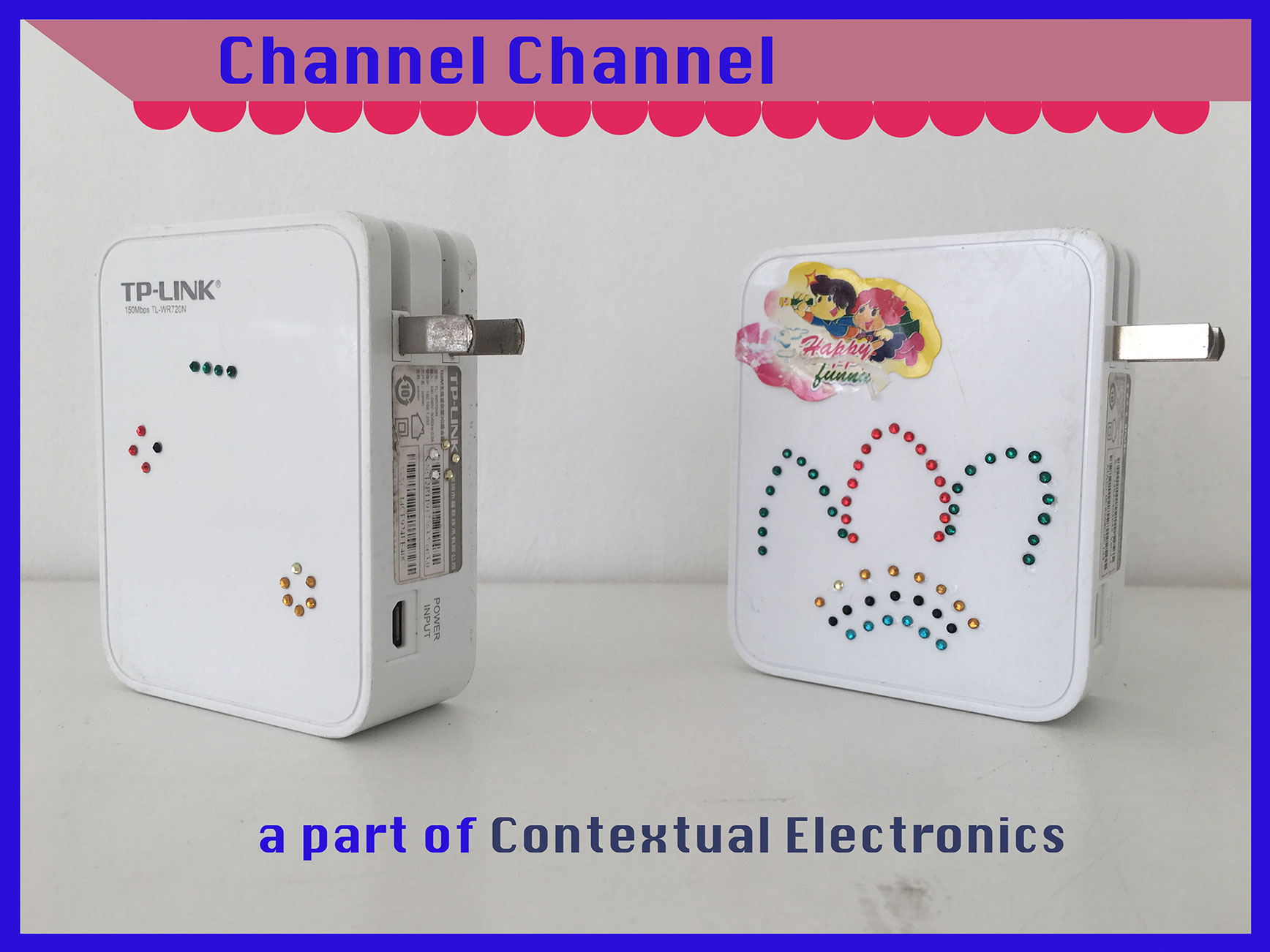
Channel Channel is a project that involves around the basic usage, access and further social dynamics of VPN, which stands for Virtual Private Network. It's a tool to extends a private network to external network environment to provide safe, private access. In practical reality the usage of this tool is embedded in complex situations, such as to circumvent state fire wall and bypass geographically restricted content. This project adopts a DIY working attitude. The underlying... read more
Currency
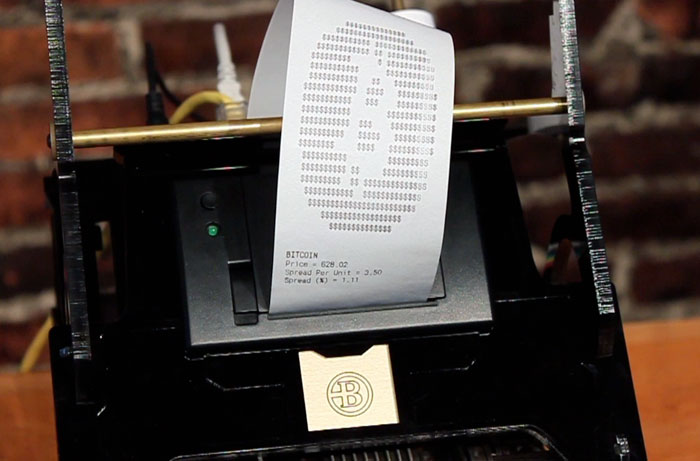

'Currency' is an electronic game and custom game console constructed from an obsolete 1917 Burroughs adding machine and a microcontroller. The console monitors the exchange rate of bitcoins to US dollars and uses this data to generate a game level that prints out on a roll of receipt paper. Using the adding machine's grid of numeric buttons, players attempt to pull two columns of printed ASCII symbols together while being either aided or impeded by... read more
Made in Iran
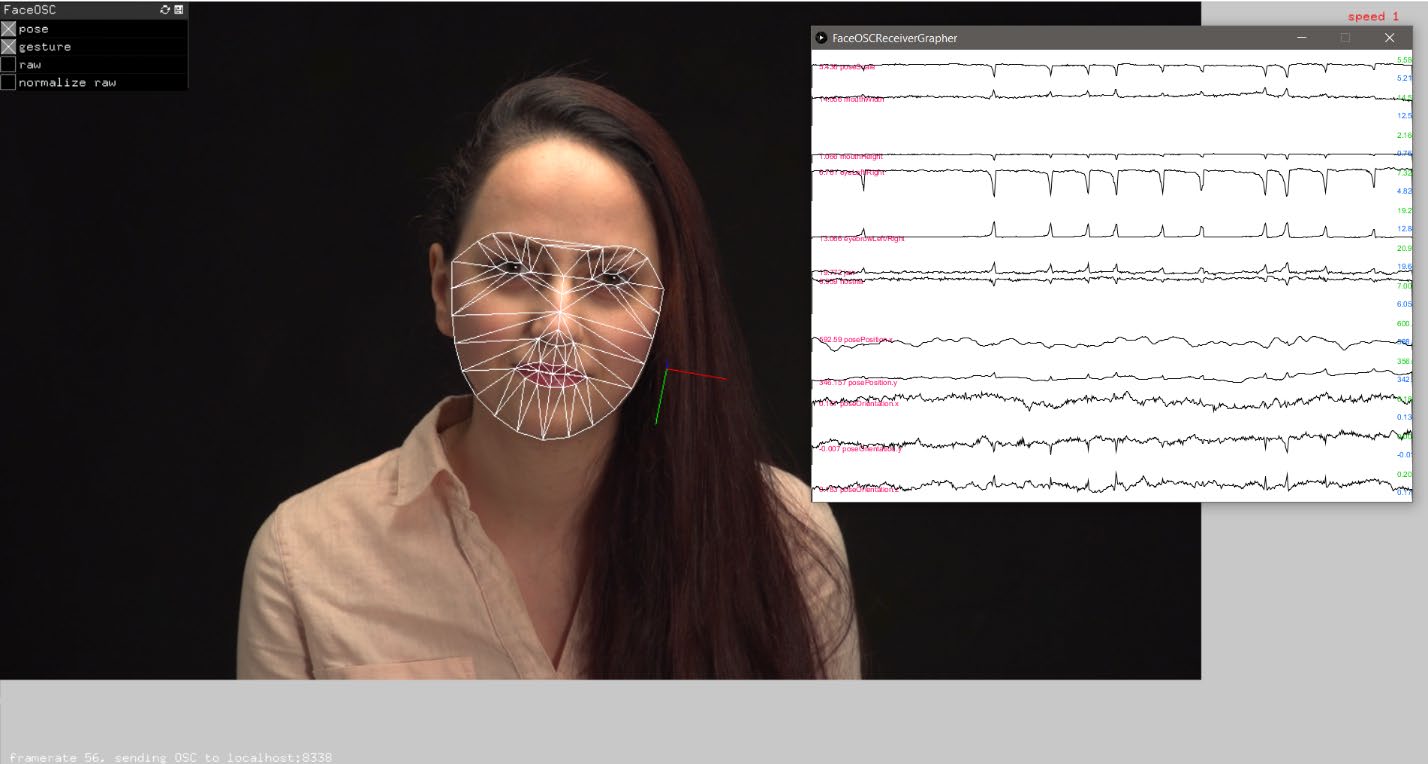
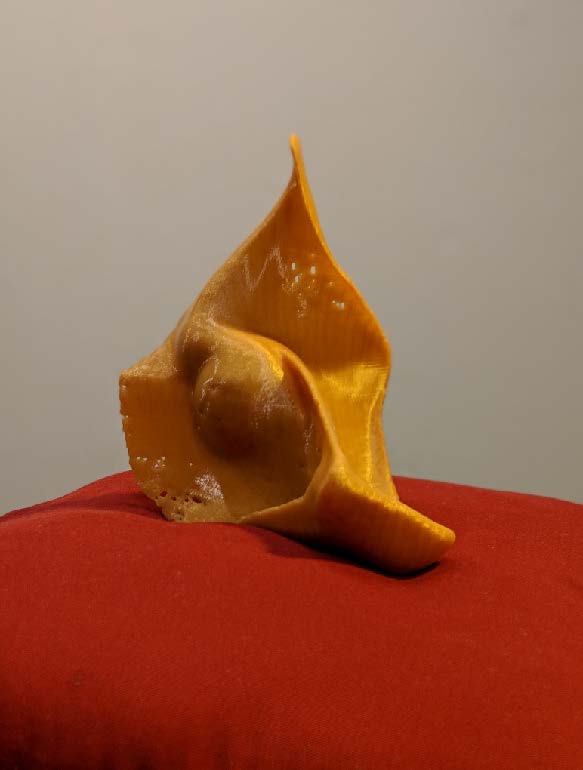
Made in Iran is the outcome of several interviews with 12 Iranian individuals, living in the United States, whose lives are affected by the travel ban. Throughout this conversation they portrayed how, as the result of recent feuds between the two countries, their identities are often assumed by others to only comprise their nationality. In this project I tried to portray their complexity, depth and presence by interviewing them and asking them to share in... read more
The Magi system, exploring the aesthetics of network infrastructure
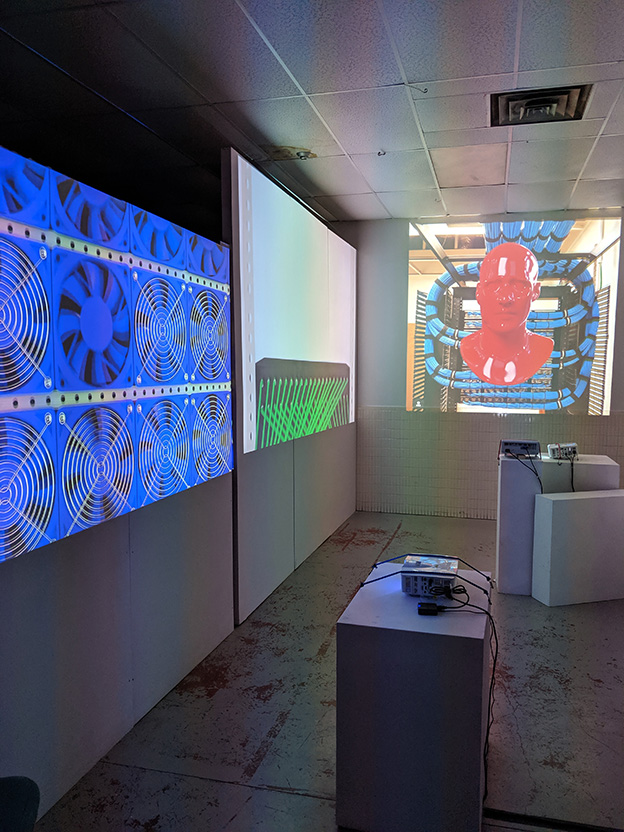
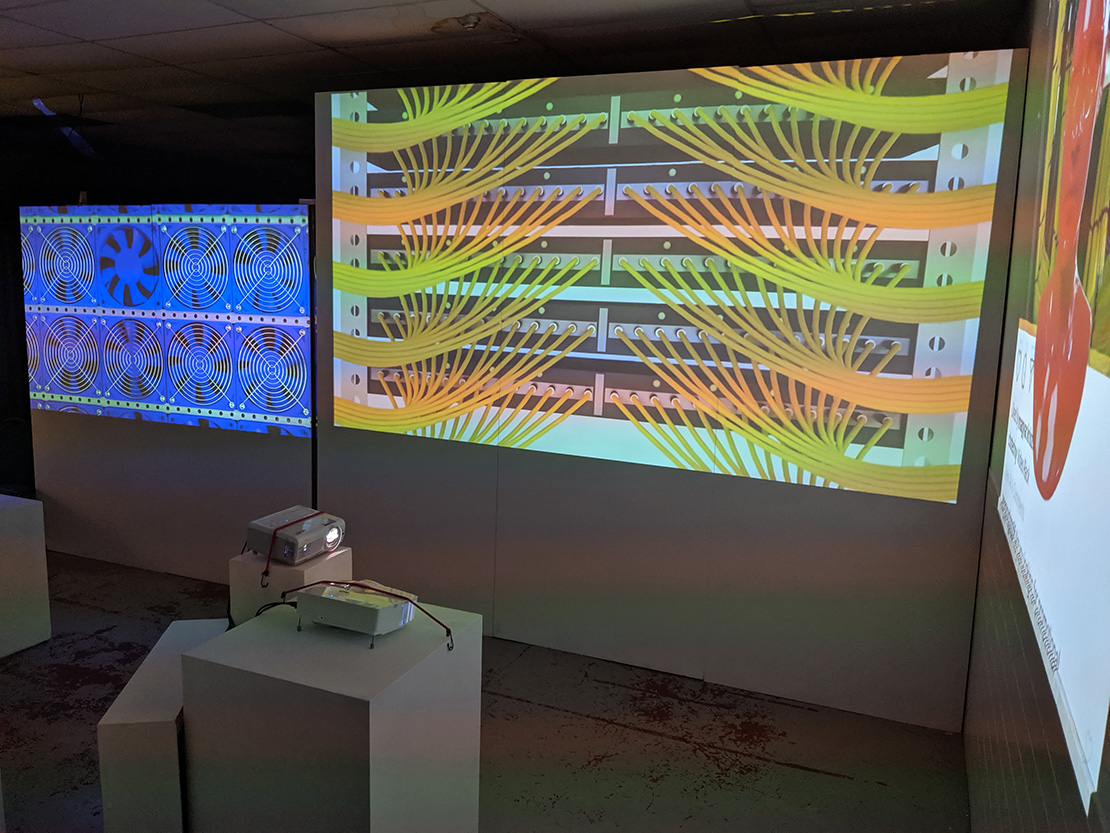
The Magi system is a two channel animation which explores the aesthetics of network infrastructure. There has been a recent trend of users posting pictures of server racks and network wiring on forums like reddits r/Cableporn and r/Cablefail. These images have spread out and proliferated on hashtag based platforms like Instagram and Pinterest. This project uses images and themes from these platforms as a starting point to investigate popular conceptions of how we visualise network... read more
Torrents of sex
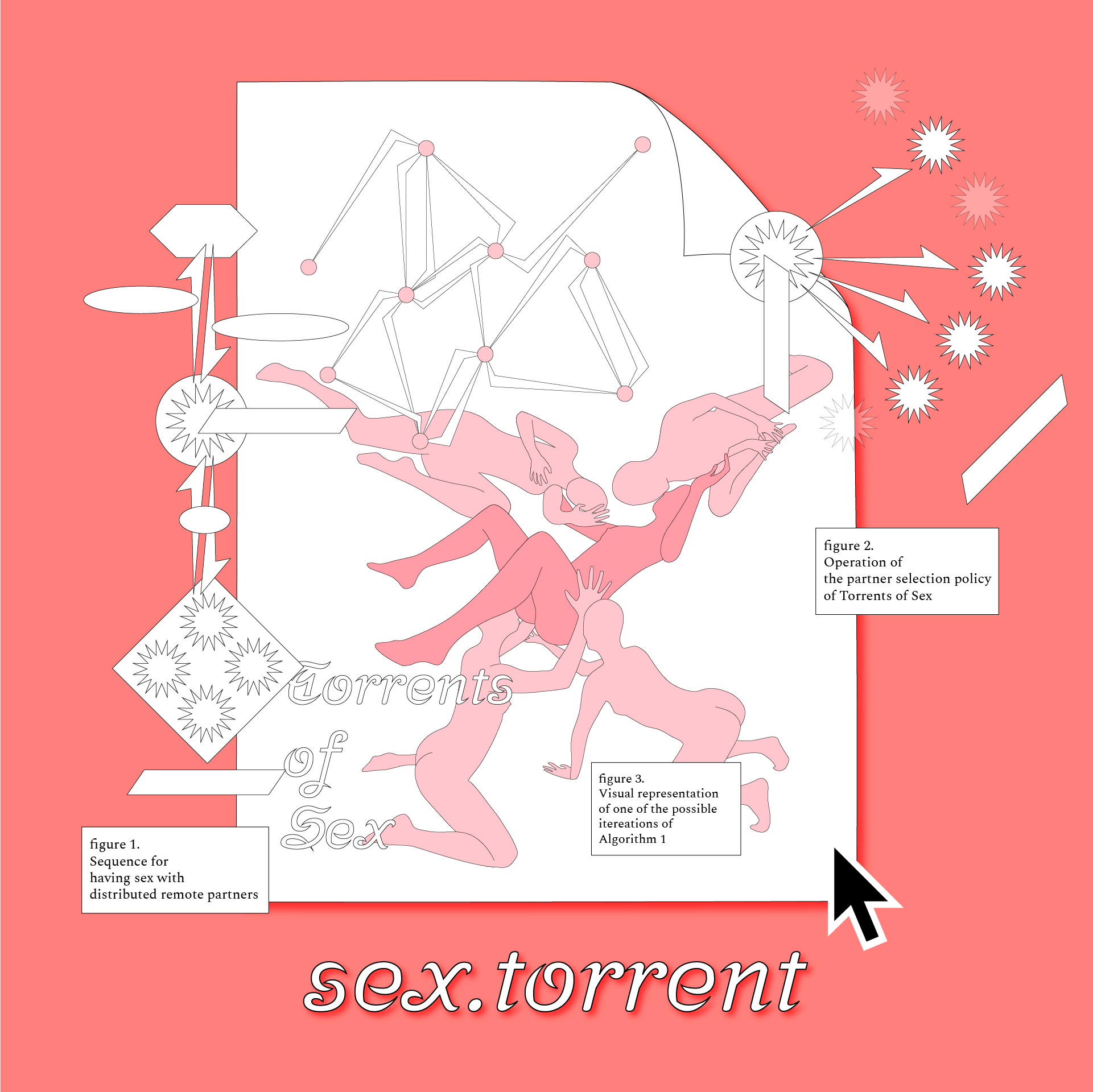
<Torrents of Sex> is one of the projects of Nahee.app, web-based performance project about sex and network technology. Assuming that someday human can upload and download their somatic sensations onto the web, Nahee.app designed peer-to-peer polyamorous sexual relationship network protocol <Torrents of Sex>, inspired by BitTorrent’s file distribution & peer selection algorithms. In this project, I regard myself as a web application having sexual desire and speculate what would happen if that programmable entity can... read more
Presenters
Adam McFillin
Adam is an artist engaged in producing works that investigate power and its presence in the protocols and structures of communications networks. By making signals, packets and protocological rhythms audible or visible, he aims to expose the materiality of the digital network and evade the abstractions that exist between user and machine.
Alfredo Lopez
Veteran activist Alfredo Lopez has been in movements for fundamental change for over a half century. He is a founder of May First Movement Technology and is the organization's movement work coordinator. He is the principle developer of the Technology and Revolution concept.
Andreas Dzialocha
Andreas is an electric bass player, producer, composer and developer. His work consists of both digital and physical environments, spaces, festivals, software or platforms for participants and listeners. The computer itself serves as an artistical, political, social or philosophical medium, dealing with computer culture, machine learning, platform politics or decentralized networks. He studied art history, musicology, media philosophy and computer science in Berlin where he also lives and works.
Andrew Louis
Andrew is a software developer based in Toronto. He's currently working on building a digital Memex as well as researching the history of similar projects. Previously, he was the co-founder and CTO of ShopLocket, an ecommerce startup acquired in 2014. When he's not coding, he spends his time on obsessive projects such as attempting to bike on every street in Toronto, taking photos of only doors (instagram: @hyfen), and making voxel art.
Asia Bazdyrieva, Alexey Orlov, Solveig Suess
Currently based in Berlin and Kyiv, Geocinema consists of art historian Asia Bazdyrieva and filmmaker Solveig Suess. With Geocinema they consider planetary-scale sensory networks – cell phones, surveillance cameras, satellites – as a vastly distributed camera, each running through their own sets of scales and temporalities while producing terabytes of raw data. While taking cues from these networks, the episodic documentary project looks to such infrastructures of earth-sensing data as forms of cinema. Geocinema as a practice began during The New Normal 2018 with Alexey Orlov, at Strelka Institute Moscow. Their upcoming episode takes the Chinese-led Digital Belt and Road (DBAR) as a starting point, to be released Spring 2020.
Bahar Noorizadeh
Bahar Noorizadeh is an artist, writer and filmmaker. She works on the reformulation of hegemonic time narratives as they collapse in the face of speculation: philosophical, financial, legal, futural, etc. Her work has appeared in the Tate Modern Artists’ Cinema Program; Berlinale Forum Expanded; Biennale of Moving Images, Geneva; Toronto International Film Festival; Barcelona Museum of Contemporary Art; Beirut Art Center, and Mercer Union, Toronto; among others. Noorizadeh is a founding member of BLOCC (Building Leverage over Creative Capitalism), a research and education platform that proposes pedagogy as strategy, to alter the relationship between Contemporary Art and the planetary phenomena of urban renewal and social cleansing. Her current research examines the intersections of finance, Contemporary Art and emerging technology, building on the notion of “Weird Economies” to precipitate a cross-disciplinary approach to economic futurism and post-financialization imaginaries. She is pursuing this work as a PhD candidate in Art Practice+Theory at Goldsmiths, University of London.
Ben McCarthy
Ben is an electronic musician and sound artist from Toronto, Canada. Working fragments of field recording and found sound into music that slips in and out of generic idiom, McCarthy’s output is rangey and prolific. McCarthy won the Dora award for Outstanding Sound Design and Composition in Independent Theatre in 2019, while his sound design for videogames has shown at the Venice Biennale, 2018, Amaze Berlin, 2019, and Mayworks’ Nightshift, 2019. His podcast Precariat Content explores art as labour through interviews with working artists such as Kent Monkman, Jordan Tannahill, and Maria Chavez.
Biyi Wen
Biyi is an archiver living in Rotterdam. Currently enrolled in Experimental Publishing Masters course in Piet Zwart Institute.
Brett Ian Balogh
Brett is a Chicago-based artist, designer and instructor making aural, sculptural and cartographic explorations of the electromagnetic spectrum. He is currently an adjunct associate professor at the School of the Art Institute of Chicago, teaching courses in tactical media, electronics, robotics and biological communications.
Brett Wallace
Brett is a New York-based artist whose practice involves an exploration of the future for workers. His work spans writing, photography, experimental/documentary video, performance and installation. Wallace is also the founder AMAZING INDUSTRIES – an R&D startup-as-artwork that demystifies the future of work and advocates for workers in the digital age. His work has been shown at Silas Von Morisse Gallery, New York, SPRING/BREAK Art Show, New York, Reshaping Work, Amsterdam, Satellite Art Show, Miami, NURTUREart, New York and has been reviewed and mentioned in The New York Times, Brooklyn Rail, ARTnews, artnet, Artslant, Hyperallergic and WHITEHOT magazine. Wallace is currently a member of NEW INC, the world's first museum led incubator created by the New Museum.
Cecylia Bocovich
Cecylia is a developer on the anti-censorship team at Tor Project and spends most of her time working on projects of digital resistance against state control. She is also interested in reducing the alienating affect of technology, and spent some time exploring the possibilities of local networks as a part of the UnMonastery Zagori test lab.
Corey Abell
Corey works and studies as a Masters student in the English department at Simon Fraser University on the unceded Coast Salish territory of Vancouver, BC. His current SSHRC funded project investigates the rise of the online community Incel through psychoanalytic and critical theory lenses, paying special attention to the enframing of memes as cultural capital for the Incel. Corey also enjoys snowboarding, writing, playing music, and being a cat-dad.
Danny Spitzberg
Danny is a user research and sociologist based in Oakland, California. He volunteers with Tech Workers Coalition, a worker-led, all-volunteer network building working power in the tech industry. He works with Start.coop, a business ownership accelerator, and with a tech collective working with new cooperative platforms worldwide.
Elisabetta Ferrari
Elisabetta is a PhD Candidate in Communication at the Annenberg School for Communication, University of Pennsylvania (USA). Elisabetta's work focuses on the relationship between social movements, protest and digital technologies. Her dissertation research explores how contemporary radical leftist activists in Europe and the United States imagine the role of technology in their struggle for social change. She uses creative visual methods to engage activists in thinking critically about technology.
Farhad Bahram
Born in Iran, a society with stringent regulatory control over all types of communication, Bahram developed a keen interest in understanding how the performance of individual actions could affect the outcome of our social encounter. His practice involves performance, installation, books, ephemera, social media, video and photographs. He received his MFA from the University of Oregon, where he held a teaching position as a Career Instructor of Art for 5 years. Currently he works as an Assistant Professor of Digital Media at the Indiana State University since 2019.
Georgiy Shibaev
Georgiy (a.k.a. Mauve) is a freelance software developer working on decentralized and P2P software. He's passionate about the web, and enabling people to own their data, communities, and software. He's currently working at the Dat project on developer experience by building tools to make it easy to work with Dat across environments like the Web and Node.js.
Gottfried Haider
Gottfried is an artist, educator and software tool-maker. He currently lives in Los Angeles.
Grant Gallo
Grant is a professional network engineer who builds temporary wireless networks for a living.
Hector Sanjuan
Hector works at Protocol Labs and leads the IPFS Cluster project, a distributed application using many parts from the libp2p and IPFS stacks.
Hiba Ali
Hiba is a new media artist, writer, curator and musician from Chicago, Illinois, U.S.A. Her performances and videos concern music, labour and power. She conducts reading groups addressing digital media and workshops with open-source technology. She is a PhD candidate in Cultural Studies at Queens University, Kingston, Canada. She has presented her work in Chicago, Stockholm, Toronto, New York, Istanbul, São Paulo, Detroit, Dubai, Austin, Vancouver, and Portland.
Jack Jamieson
Jack is a PhD candidate at the University of Toronto's Faculty of Information. His research investigates intersections of digital technologies with culture, with a focus on issues related to values, labour, and interoperability. Specifically, he studies how web developers shape the direction of the Internet by creating, contesting, co-opting and compromising with platforms and standards.
Jaya Klara Brekke
Dr. Jaya Klara Brekke is a critical theorist and political cryptoeconomist and one part of the CoBox project looking to enable a privacy aware p2p cloud. She recently completed a PhD titled Disassembling the Trust Machine, three cuts on the political matter of blockchain, from Durham University Geography department, where she is also currently undertaking a postdoctoral fellowship. She has worked on questions of power and (geo)politics in network infrastructures for the past ten years as a designer, writer and public speaker.
Jennifer Seaman Cook
Jennifer is a transnational American Studies scholar, media theorist, essayist, and creative writer. Working at the intersections of politics and poetics, she specializes in visual and public cultures, cultural and social movements, and media and technology studies. Jennifer’s writing can be found in 3:AM magazine, Cedilla Literary Journal (Ç viii, 2014) alongside Amiri Baraka (archived at University of Montana), LA Review of Books, PopMatters, Queen Mob’s Tea House, Salon and more. She also blogs about pre-digital to digital culture and the Experimental Television Center at HASTAC. She can be found in several anthologies and is forthcoming with Clemson University Press. Her arts writing in anthology has premiered at the Frankfurt Book Fair and MoMa PS1.
Jillian Murphy
Jillian volunteers with NYC Mesh with a particular passion for breaking down social barriers through technology and education. Jillian is an install leader, event organizer, and author of the organization's monthly newsletter. The IRS knows her as an administrator at New York University where she is also a graduate student in business.
Joanne McNeil
Joanne McNeil is a writer interested in the ways that technology is shaping art, politics, and society. She received the inaugural Arts Writing Fellowship Award for an emerging digital arts writer from the Carl & Marilynn Thoma Art Foundation. She is a 2019 Logan Nonfiction Program fellow. She was an Artist-in-Residence and an Impact Resident at Eyebeam. Her book, Lurking: How a Person Became a User, is forthcoming.
Kirill Pimenov
Kirill graduated from Moscow State University as a Specialist (≅Master of Science) in Physics, with a specialization in computer modelling of optical properties in liquid crystals, in 2010. The word 'computer' turned out to be the most exciting in that phrase for me, so since then I founded and acted as a CTO for my own startup (which flopped), moved to Germany to develop software in SUSE Linux GmbH, and ended up acting as a Head of Security for Parity Technologies.
Lai Yi Ohlsen
Lai Yi is an artist and tech worker operating at the intersection of media and movement. She works to promote open data and advance Internet research and policy as Project Director at Measurement Lab. Previously, she worked to defend and promote human rights online with eQualitie. She is a 2019 Artist in Residence at Movement Research and her work has been shown at Movement Research's Fall Festival, New York Art Book Fair and the Internet Archive's Decentralized Web Summit. Lai Yi has been supported by Jonah Bokaer Arts Foundation, rehearsal Residency, Pioneer Works and Peer-to-Peer NYC. She is the author of '100 Scores: movement inspired by computers' and tends to her creative practice at Soft Surplus, a collective warehouse space in Brooklyn. Her current research interests include the proliferation of movement through crappily compressed images, the resistance of automated 'best practice' bodies, and how analog forms move in resistance against digital power.
Laniyuk
Laniyuk is an award winning queer Aboriginal poet born of a French mother and a Larrakia, Kungarrakan and Gurindji father. Her poetry and short memoir reflects the intersectionality of her cross cultural and queer identity. She contributed to the book Colouring the Rainbow: Blak Queer and Trans Perspectives. She is currently exploring the intersection of her poetry, decolonial theory and P2P technologies (poetic computation ala Taeyoon Choi) co-running workshops for queer people of color in Melbourne exploring accessibility and safety of P2P technologies. She has also run decolonial lectures and workshops for universities and in Aotearoa New Zealand at the first Scuttlebutt gathering.
Lauren Traugott-Campbell
Lauren is a graphic designer and artist working in exhibition and print design at MGMT Design in New York City. Her work investigates the materiality of digital systems and the labor involved in making them run.
Libi rose striegl
Libi is an an artist and PhD student currently based at the University of Colorado, primarily in the Media Archaeology Lab & the Blow Things Up Lab. Libi's work is focused on tech defamiliarization as an educational tool, using workshops as both an education and artistic practice. Libi is interested in the technological, social and environmental implications of convenience and regularly hosts workshops on tech repair, retro technology, privacy & security, open source practices, and alternative networks.
Lorraine Chuen
Lorraine is a co-organizer for IntersectTO, a community for BIPOC (Black, Indigenous, and/or people of colour) folks interested in tech and digital justice. IntersectTO's aim is to have a space for folks to share tech skills, find collaborators, and hold critical discussions on how technology affects communities of colour.
Marie Otsuka
Marie is a designer and programmer working around tools and methods for making. She is currently drawing typefaces and developing scripts at Occupant Fonts, while independently collaborating with various authors, artists, and designers.
Nahee Kim
Nahee is an artist and a web developer exploring programmability of human sexual behavior. She writes code poems, builds web applications, draws illustrations and makes videos regarding body images bound up with sexuality, power dynamics and communication protocols in sexual relationship and experimental approaches to human reproduction. She studies and teaches at Hunter College, studied at School for Poetic Computation, was a resident at MassMOCA, is a member of Soft Surplus which is collective workspace in Brooklyn and was a member of Eobchae which is an artist collective in South Korea. She is based in New York and Seoul.
Renée Reizman
Renée is an interdisciplinary curator, artist and writer at the crossroads of curation, social practice and creative placemaking. By embedding herself in communities, Renée identifies object-oriented networks shaped by cultural aesthetics, urbanization, law, and technology. You can find Renée's writing in publications like Hyperallergic, Vice, and Chicago Magazine. She is currently Artist in Residence at the Los Angeles Department of Transportation.
Sam McGarva
Sam believes that all design should be human-centred. She’s excited about the role designers can play in developing technology & policy that considers the real needs and values of people. She currently works as a freelance designer, researches & teaches in the School of Design at George Brown College, and studies for a Master of Information at the University of Toronto (with a concentration in Culture & Technology and Critical Information Policy Studies).
Scott Rasmussen
Scott focuses on telecommunications policy as it intersects with questions of equity and access. After years of policy work on Capitol Hill, he is now working with NYC Mesh, an open, neutral, and resilient community network aiming to make a home or business internet connection accessible and affordable to all New Yorkers.
Sphere Collective
Sphere is an artist collective of Brian Patrick Franklin (MFA, New Media, Pennsylvania State University) and Chris Wille (MFA, Metals, Illinois State University) who explore the complex and often blurry relationship between virtual and physical objects, actions, and identities. Sphere's work has been exhibited in solo and group exhibitions as well as being presented at prominent festivals and conferences including The World Maker Faire and The Digital Games Research Association Annual Summit.
Tobias Williams
Tobias is an artist and educator based out of Toronto Canada. He has an MFA from York University and currently works as an instructor at OCAD U, Humber College and Toronto School of the Arts. His art and research practice uses 3d animation to explore the intersection between art, society and technology. Recent projects of his have focused on topics such as the history of the Blockchain, hashtag aesthetics and the ontology of virtual art spaces.
Victoria Barnett
Victoria is a freelance digital graphic designer and trainer based in Toronto, and is a steering committee member of the Design Justice Network, which rethinks design processes, centers people who are normally marginalized by design, and uses collaborative, creative practices to address the deepest challenges our communities face.